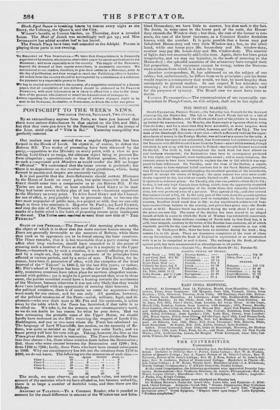STATE ow Tuts PRBRA013.-The Times of this morning gives a
table, the object of which is to show that the more ancient houses among the Peers are generally favourable to the measure of Reform, while those that rank as its opponents are to be found among the later creations. The Times remarks, that it is but reasonable that a party coming into Office after long exclusion, should have conceded to it the power of creating such a number of Peers as shall give it a majority in the Upper Mouse,-inasmuch as, by such a creation, it is merely effecting at once, and by a single act, that which the opponents of its principles have effected at various periods, and by a series of acts. The Tories, for in- stance, have been in possession of office, with the exception of the brief Interval of the " Talents" in 1806-7, for the last.fifty years; or rather, Mfr. Pitt's school of Toryism has been in office fin. that time. Undoubt- edly, numerous creations have taken place for services altogether uncon- verted with politics ; yet it might be a priori expected that, even in those cases, the parties ennobled would have a leaning towards the sentiments a the Minister, because otherwise it was not very likely that they would lave I eon indulged with an opportunity of earning their honours. In the political creations, there is of course no room for argument-they were made for one reason, and for one only. All question, however, a the political tendencies of the Peers-naval, military, legal, and di- plomatic-who owe their seats to Mr. Pitt and his successors is taken away by the table which the Times has furnished, if that table is to be relied on. We take it, for the present, on our contemporary's word, as we do not doubt he has reason for what he puts down. Had we been estimating the probable votes of the Upper House, we should lardly have reckoned on the Bill's receiving the support of Lords Fife, Baddington, and one or two more whom the Times has calculated on. The language of Lord Wharncliffe, last session, on the necessity of Re- form, was quite as decided as that of these two noble Earls ; and we know pretty well how his vote will go. Taking, however, the lists as the Times gives them, the result is instructive. The Times divides the Peers into four classes-Ist, those whose creation dates before the Restoration ; 2nd, those who were created between the Restoration and 1700; 3rd, from 1700 to 1760; lastly, those Peers who have been created subsequent to 1800. Why our contemporary has left out the creations from 1760 to
1800, we do not know.
The following are the summaries of each class :- For Against. Doubtilli. Absent, ,St,
Class I
13 .......
7 1
Class 2 10 ..... 8 .
Class 3 20 14 4
2 •
Ciass 4
48 66 15 ...... 0
•
101 95 20 16
• The totals, we may observe, are not of much value, not merely on account of the omission which we have alluded to, but because, unluckily, there is so large a .number of doubtful votes, and then there are the Bishops. ANATostY ow Taxamus.-To a Constant Reader, who is puzzled to account for the small difference in amount of the Window-tax and Inha-
bited House-duty, we have little to answer, but that such is the fact. No doubt, in some cases in the lower part of the scale, the House- duty exceeds the Window-duty ; but then, the rate of the former is con- stant; the rate of the latter increases, as a Constant Reader doubtless knows, with the number. It is quite possible that a house may pay Inhabited House-duty and very little Window-tax; but, on the other hand, while one house pays 20s. house-duty and 10s. window-duty, another may pay 20s. house-duty and 30s. window-duty. The number of lights does not necessarily add o the rent. Again there has been great irregularity, and we may say injustice in the mode of assessing to the House-duty ; the splendid mansions of the aristocracy have escaped their fair proportion. Our statement cannot be wrong, unless the Govern. mein accounts from which it is taken be wrong.
Another correspondent, B, has addressed us on the subject of our tables ; but, unfortunately, he differs from us in principles ; and his letter would require a commentary that would, we fear, be more lengthy than satisfactory to general readers. In one respect B has mistaken our meaning ; we did not intend to represent the military as always used for the purposes of tyranny. The Brazil case we must leave time to decide.
CAPITAL Pc stsininiirs.-The communication of our respectable cor- respondent in Plough Court, on this subject, shall not be lust sight of.


























 Previous page
Previous page